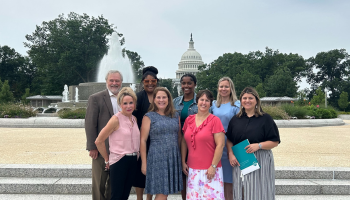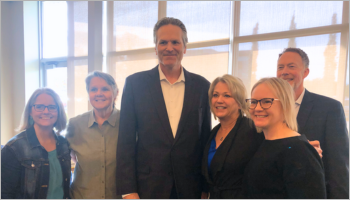ASHA Advocate: September 6, 2024
September 6, 2024
Campaign Season Advocacy
Campaign season has officially started in earnest as both major political parties held their national conventions. While the presidential election will dominate the headlines for the remainder of the year, ASHA is working hard behind the scenes to build support for key policy priorities that are beneficial to you—like preserving Medicare payments, expanding coverage of audiology and speech-language pathology services, and more. Check out the latest advocacy news and take action on issues impacting you and your profession.
Alaska Joins the Interstate Compact
Advocacy win! On August 30, Alaska Governor Mike Dunleavy signed SB 75, a bill to adopt the Audiology & Speech-Language Pathology Interstate Compact (ASLP-IC), into law. Alaska is the 34th state to adopt the ASLP-IC. ASHA Advocacy worked with Senator David Wilson, the Alaska Speech-Language Hearing Association, and ASHA members to get this legislation passed. The ASLP-IC will be implemented in 2025, so stay tuned!
ASHA-Supported Bill Would Make CSD Degrees More Affordable
Current and future federal student loan borrowers would benefit from a federal bill ASHA just supported. The legislation, the Student Loan Interest Elimination Act (H.R. 4986/S. 2557), would allow borrowers to refinance interest rates on current student loans to 0% and establish a need-based sliding scale for future borrowers capped at 4%. ASHA believes that audiology and speech-language pathology students and providers deserve the opportunity to become thriving, active professionals without burdensome debts so that they can serve clients, patients, and students in a diverse range of settings. Take action now to support this effort.
Federal Trade Commission’s Ban on Noncompetes Halted by Federal Judge
A federal judge recently struck down the FTC’s ban on noncompete agreements. The ban was set to go into effect on September 4, but with this ruling, this deadline is no longer in effect and employers and employees should continue to abide by state laws regarding noncompetes. Learn more about what the noncompete ban means for employees and employers here.
Working for You
- Submitted comments to the Centers for Medicare & Medicaid Services (CMS) on the home health prospective payment system [PDF] for calendar year 2025 proposed rule.
- Met with Midwest State Advocates for Reimbursement (STARs) to discuss Medicaid advocacy strategies across the region.
- Joined a meeting with Highmark Blue Cross Blue Shield of Pennsylvania to discuss burdensome prior authorizations, rate cuts, and proposed models.
- Met with leaders from several state speech-language-hearing associations to discuss their priorities for the year and identify ways ASHA can support members and legislation.
- ASHA’s Director of Federal Affairs for Education, Eric Masten, has been elected as a co-chair of the National Alliance of Specialized Instructional Support Personnel (NASISP). ASHA is a founding member of the coalition, which includes 20 associations representing the range of specialized instructional support personnel/related service providers and administrators.
- CMS released its final rules for skilled nursing and inpatient facilities, which will go into effect October 1, 2024. Key issues ASHA commented on earlier this year include quality reporting and data collection related to social determinants of health.
Spotlight!
ASHA Advocacy staff members Caroline Bergner and Meghan Ryan attended the summer meeting for the National Association of Insurance Commissioners (NAIC) to advocate for our members. They met with many insurance commissioners—such as Paul Lombardo from Connecticut and Vicki Schmidt from Kansas—and their staff to make beneficial connections and bring ASHA member issues to the forefront. They also met with the Illinois Speech-Language-Hearing Association's state advocate for reimbursement and leadership from ISHA's billing and reimbursement committee to discuss issues affecting private practice, including payment cuts and administrative burden for small practices.















